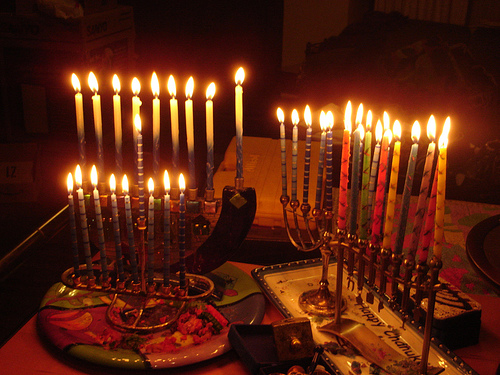Ellie Ivanova Ponti

Photo: hermanturnip
Today we associate holiday gift-giving with Christmas, but just as many other Christmas customs and symbols, blending holiday traditions coming from other religions, gift-giving has its sources in multiple cultures practices.
Many Christmas traditions come from the year-end holidays in the Roman Empire, the Saturnalia and the Sol Invictus, held on December 25 and celebrating the Winter Solstice. Gift-giving was also part of those celebrations, but gifts were given to the emperor (who could request specific items), as well as to poor people, instead of being distributed among family members or to children.
In fact, the tradition of offering gifts to figures of regal power is mirrored in the New Testament story about the gifts given to baby Jesus by the Magi. They learned though their knowledge of the stars that a King was to be born and traveled from their distant lands to bring the future King their symbolic gifts: gold (symbol of power), frankincense (transcendence) and myrrh (according to later Christian tradition, symbol of death and resurrection).
Another occasion in which the significance of gift-giving coincides with that of Roman culture is the gift-giving gesture of Saint Nicholas, an early medieval Christian bishop of Myra, who was generous to the poor. His gifts were act of charity to those in need. This association emphasized the symbolism of gift-giving and developed the idea of charity within the Christmas holiday.

Photo: catsper
Since the Early Modern times, gifts given to family member gradually became an essential element within the European tradition of Christmas celebration. Gifts were given by St. Nicholas, now known in different cultures under different names, ranging from Santa Claus to Sinterklaas, Kris Kringle, Père Noël, Joulupukki, Babbo Natale, Weihnachtsmann, even Saint Basil and Father Frost. His features are a blend from Germanic and Dutch folklore, real personages of early Christianity and modern characters, but all of them carry the significance of an extra-ordinary figure dispensing something desired or special. Sometimes he is overlapping with Father Christmas, an allegory of Christmas itself and not a gift-giver.
However, not all gifts are given by Santa, even within the Christian tradition. In some Catholic countries, they are brought to children by Baby Jesus; in still others, gifts come on January 6 and are brought by the Magi or (in Italy) a good-natured old woman, Beffana, who is an impersonation of the holiday of Epiphany itself.
In any case, today gifts are an essential element of the season: small or expensive, practical or symbolic objects, sweets and candy, toys for children, gift cards, even intangible presents such as “coupons” for desired gestures of attention on behalf of the giver.

Photo: andrewk100
The gift-giving tradition of Christmas has been transferred to Hanukah as well. Originally, no gifts were given in relation to this holiday. However, the desire to propose an alternative to Christmas and especially its gift-giving custom has invariably led to gifts being introduced in Hanukah celebrations as well. In the beginning, children were given “gelt”, or money coins, if they could answer adults’ questions about the holiday itself. Money could be hidden in different places throughout the home and children were to find it. Also, the traditional dreidel is played by children to win gelt. Money today is substituted by chocolate gelt, or chocolate coins wrapped in golden foil, but other gifts are also exchanged within families just as on the occasion of Christmas. In addition, gift-giving is part of Kwanzaa, also celebrated during the year-end season.

Photo: shoshanah
More than just the fact that gifts are being exchanged, it is important to consider the significance the gift-giving practice attaches to gifts themselves. In the Jewish Hanukah, for example, gelt and gifts represent blessings for the gift recipients as well as a reminder of the Hanukah miracle, celebrated through the holiday. Gifts may represent the special relationship between giver and recipient, may seek to emphasize the joy the holiday represents, even create an atmosphere of relationship to the transcendental world, through which human desires and needs can be always satisfied. Secret Santa traditions, in which members of a group are assigned, lottery-style, the name of another member to give a gift to, strengthens the ties among people in that group, be it a workplace or extended family.

Photo: brittanyculver
Giving gifts in relation to such a special holiday, especially to children, is a way to impart on them the spirit of the season and the specialness of the moment. However, this tradition is not without a controversy. Some people reject the notion of lying to children about the existence of a fictional character who brings gifts and, by extension, giving them the idea that desired goods come as gifts from above. Psychologists, on the other hand, warn against telling children that Santa brings gifts only to children who have been good and nothing to those who haven’t. They point out that this may make children feel anxious and excluded from the holiday spirit and lower their self-esteem in anticipation of being penalized for their non-perfect behavior. Also, if the family is not able to afford what their children want, they may feel Santa has slighted them even if they have been good during the year. Other people complain about the extreme commercialization of the tradition, which has led to presents losing their special status and becoming just a chore to buy things that would not be appreciated by the recipient in today’s life of overabundance. They prefer to give only to people in need whose lives would be transformed by the gifts.
In fact, gifts related to any holiday are a representation of the power and the desire of the giver to transform the world for the better and positively influence the lives of those around us. It depends on the giver’s thoughtfulness and consideration how this power is used.











3 comments so far ↓
Nobody has commented yet. Be the first!
Comment